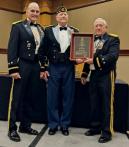Canada went to war in September 1939, two years before Pearl Harbor and the American declaration of war on Dec. 7, 1941.
What happened to our family in those early years was a foreshadowing of what was going to happen to millions of American families
It was the fall of 1939, and the war had just started but hadn’t yet made its impact on our family. The older siblings were having a party as Mom and Dad were away visiting relatives.
The music and dancing started, the place was swinging. I was peeking through the rungs of the stairs with my brother Dick when Mary sent us to bed. My brother, John, heard the commotion and later came up to our room.
“I’ll show you a place on the stairs where you can watch and listen.” He led us back to a secret place to a place on the stairs, then gave us a kiss goodnight.
We watched as Mary wound up the Victrola and put on a Bennie Goodman 78 rpm record. It was “Swing, Swing, Swing,” the one Bennie played at Carnegie Hall.
“Isn’t the music swell?” Mary asked the others, as Gene Krupa beat on the drums and everyone started to dance the jitterbug. Mary then put on Eddie Duchin’s “Moon over Miami” and everyone danced the foxtrot. The summer of 1940 brought our family the last wonderful time at our lakeside cottage.
Brothers Bob and Jim liked experimenting with the latest state-of-the-art inventions. They put a couple of bed springs on Ronnie’s wagon to give it knee-action. It was a new invention by the car manufacturers to give a smoother, less bumpy ride. Ronnie started down the steep hill at the back of the cottage accompanied by a clapping noise as the weak, coiled bed springs collapsed and expanded with each bump and the wagon jumped and lurched forward. The springs had been mounted between two boards with a hinge at one end.
Ronnie lost control of the wagon and plowed through Mom’s hollyhock flower garden, mowing them all down.
Bob and Jim’s next invention was a speed boat like the latest hero, Gar Wood. The boat was so small that they appointed skinny 12-year-old Des to be the test pilot.
I got in, they started the engine, and I took off out to the middle of the lake. The faster I went, the higher the boat tilted up and the more the boat leaked, as they forgot to put caulking between the floorboards. The water poured through the cracks and flew over my head. I turned the boat around and headed home. I cut the engine, the boat sank, and I swam ashore. The only thing keeping it afloat was the terrific speed.
John was a dreamer, a romantic, and loved the popular song “Stardust,” with the beautiful Hoagy Carmichael lyrics. He had good taste, as it is now a standard. He also loved to read classic literature or quote from poems by Keats, Burns or Byron. Mom and John clicked as she knew the sound of every bird, the name of every flower and the author of every poem. Dad and Mom admired John’s intellect and bought him a leather-bound set of “The Book of Literature” and “The Harvard Classics.”
The Depression was just ending and two years before John took off riding the rails on boxcars with the thousands of unemployed drifting from town to town seeking employment. He wanted to experience the hardship and starving of the destitute, then write a book like his hero John Steinbeck. He traveled all over, ending up at a dock in New Orleans where the starving waited for banana boats to come in so they could mooch a meal.
John had since come home and worked all the summer of 1940 at the lake lifting boulders and building a new access road. He dug a water-lily pond for my mother and placed boulders around it. It appeared that he had finally found peace as he worked shirtless in the sun looking fit and handsome with his curly, wild hair and muscular, tanned body.
The war called, and John joined the RCAF in the fall of 1940. He was trained as an air gunner then posted to Aberdeen, Scotland, for advanced operational training before being assigned to a squadron.
The evening he left town to his RCAF base the whole town seemed to have turned out for the send-off at the local community hall. He was a great storyteller and was a popular guy in a bar or a party or just to stop and talk to on the street. It didn’t matter what station in life you had, he treated everyone the same.
After the public celebration, our family gathered in the living room to have a drink, a snack and a final goodbye before he would catch the train to Halifax and board his ship.
I was only 12, so I lingered in the kitchen, not capable of being part of the conversation but just listening.
There was loud talking and laughter, then a long pause before everyone shuffled to the front door to say a final goodbye. Dad went out first to start the car to drive John to the train station.
I could hear the door close after John gave my mother and everyone a final kiss or a handshake, then there was silence as tears streamed down my face.
The front door then opened again and I could hear footsteps coming toward the kitchen where I stood.
I could hardly believe it, but there was John, and he had come back just to see me!
“I just wanted to say goodbye, Des,” he said, as he kissed me on the forehead and was gone. In the winter of 1940, he arrived in England, then went to Scotland and then to join a squadron.
Dad bought a huge Marconi radio, put it in the living room and in the evenings we gathered around to listen. When the news came on, Dad demanded complete silence as he put his ear to the loudspeaker.,
Lorne Greene, later known as Pa to Little Joe and Hoss in the TV series “Bonanza,” was the CBC Radio news anchor and was known throughout Canada as “The Voice of Doom” as his low, resonating voice would boom out all the bad war news of that time.
After the news, our family would listen to “Fibber McGee and Molly.” Fibber would open his storage closet then we’d laugh as pots, pans, and other noises the sound-effects man could make poured out of the radio. There would be silence and then more stuff would start coming out of the closet. This always got a good laugh from the radio audience and our family.
The winter of 1940 went by and our family relaxed as we received cheerful letters from John.
The summer of 1941 was a lazy, relaxing time, but the family wasn’t the same and only we younger four - Charlie, Ronnie, Dick and Des - remained. John wasn’t working in the sun, Jim and Bob weren’t experimenting with new inventions, the girls were working and it seemed too quiet. Our place on the lake had changed forever as summer turned into fall.
On Sunday, September 28, 1941 my mother set a special table, and we had a special breakfast as the brilliant sun streamed in as if blessing our family to give us strength for what we were about to endure.
After breakfast, the telegram arrived.
“Your son, John Martin Dixon, went missing in action during operations over enemy territory.”
I had finished breakfast that sunny Sunday 28 September 1941, and was sitting in the living room as Mom came in to tell me. I was only 13 and felt sorry for her as tears filled her sad Irish eyes. With childlike hope and faith, I blurted out,
“He will be alright Mom, as he’s gone to heaven.”
I’ll never forget the withering look she shot at me. She believed he would turn up in a prisoner of war camp in Germany, and as time went by, that he had amnesia. When our family was sent a picture of his grave at the Allied Reichswald Forest military cemetery in Germany it confirmed that he died in a plane crash when shot down.
Postscript: In 2016 I went back to Sudbury and saw the old house and the front sidewalk where John took those long-ago last steps into eternity.
Shortly after John was killed, 5 of my other brothers joined up. Tom was made an army captain. Ron marched to a different tune as an army private who came home on leave with a different colored regimental hat each time. The army couldn’t figure him out. I know him well and believe that if the army threw him in the brig he would just fantasize he was “The Man In The Iron Mask” or Jean Valjean of “Les Miserables” and enjoy the detention. Dick was a navy signalman. Jim and Bob were RCAF officers in Bomber Command in England. Jim served as a navigator/bombardier in a Halifax heavy bomber and Bob as a Lancaster heavy bomber pilot.
The war ended, Bob and Jim came back as heroes after completing their entire missions in Bomber Command.
They both signed up for the Pacific war but the American Air Force put a quick end to that by dropping the atomic bomb.
Postscript: In the summer of 2016 I went on a sentimental journey with my daughter, Susan, to my home town of Sudbury in Northern Ontario and had a look at the old haunts.
I saw our old summer place on the lake and the place where John dug a lily pond for my mom. Time had erased everything but a few scattered boulders.
I then went to our big house we lived in 75 years ago and looked at the front sidewalk where John took his last steps to my dad’s car, to the train station, to the ship, to England, then into eternity.
A picture of his gravestone in Reichwald Forest, Germany, was sent to our family. It was where John's Wellington Bomber was shot down as it returned from a bombing run.



